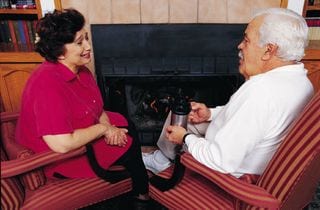 Planning in advance, rather than waiting until an emergency occurs, is the wisest way to go, when it comes to taking care of elderly parents, if they live far from you.
Planning in advance, rather than waiting until an emergency occurs, is the wisest way to go, when it comes to taking care of elderly parents, if they live far from you.
We are less likely to live around the corner from our parents or grandparents than previous generations, This distance can be a real challenge, when it comes to caring for family members facing health or aging issues.
Flagstaff Business News’ recent article, “How to Care for Loved Ones from Miles Away” reminds us that you could suddenly be faced with the challenge of long-distance caregiving.
Institutional Facilities or Care at Home. In some instances, nursing homes and retirement homes appear to be the only options available for care. However, the elderly can suffer significant emotional trauma when leaving their long-time homes and familiar surroundings. Research has shown that they do better, when they stay in their homes and familiar communities with friends and neighbors.
Finding a Home Care Agency. They offer different levels of service, so you can select an agency that offers more than basic homemaker services. Eventually, your parent may need personal care services. The agency you select should be bonded, insured, and licensed (although not all states require home care licensing). Caregivers should be experienced and vetted with at least a basic criminal background check. You should meet with the caregiver, before you agree to services. It is also important to choose an agency that complies with HIPAA.
Affording the Care Required. Since home care services are non-medical, they aren’t covered by Medicare. Home care services are generally paid individually or by long-term care insurance (LTC).
One solution to covering these costs is a reverse mortgage, which lets your parent access funds from their home equity, without disturbing their income. In addition, eligible veterans and their spouses may qualify for the Disability Pension for Aid and Attendance. That program provides funds for in-home care.
If you are still undecided on whether a loved one needs care, consider these questions to help you make a decision:
- Does your parent need help walking?
- Has his or her physical and/or emotional health been declining?
- Is he or she able to prepare nutritious daily meals?
- Can your loved one get out and shop at a store?
- Can he or she manage bills and financial responsibilities?
- Is he or she taking medications on time?
- Can your parent drive safely?
- Is he or she in need of companionship?
- Does he or she need help dressing or grooming?
Long-distance management of a parents care can be exhausting. Try to get help from other family members. If your parent is suffering from a specific illness like Alzheimer’s, ALS, or a stroke, contact the local association/support group.
An elder care attorney will be able to help you handle the legal side of long distance care and make recommendations for elder care managers, social workers and other skilled professionals, who can assist with a care plan for your loved one.
It is never too early to create a plan, but it can become too late. Please contact us today to discuss estate planning or options for long-term care planning today.
Reference: Flagstaff Business News (March 18, 2018) “How to Care for Loved Ones from Miles Away”
